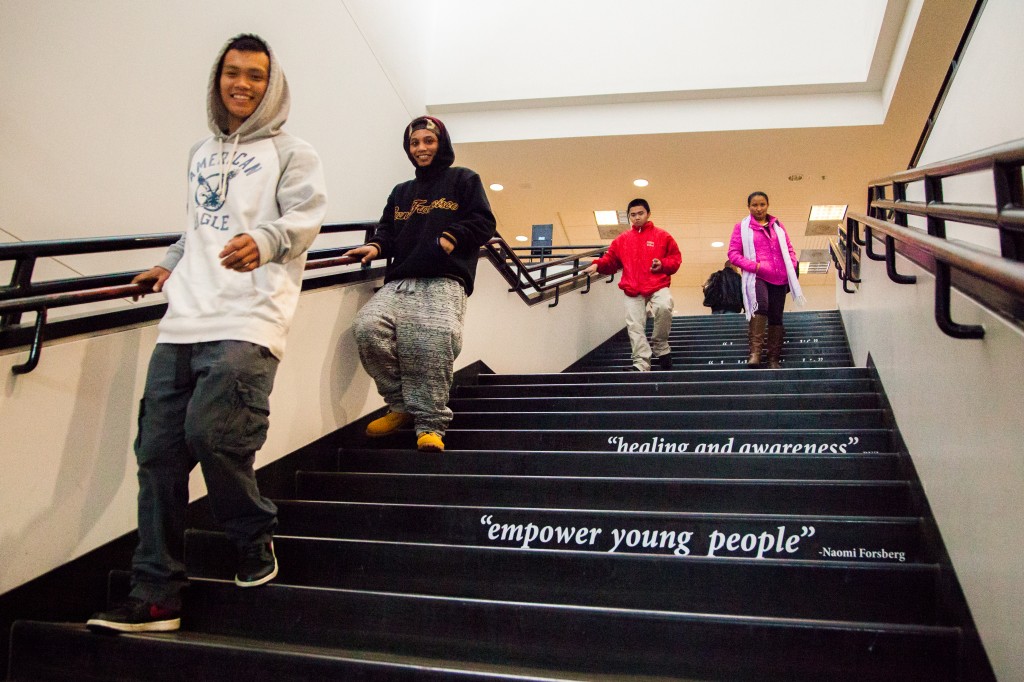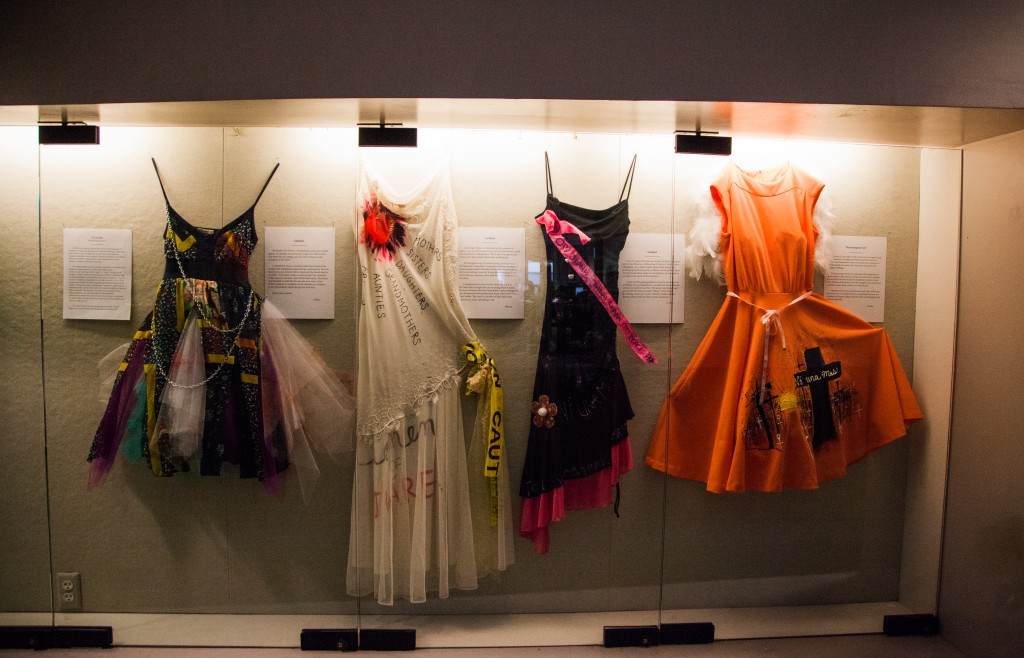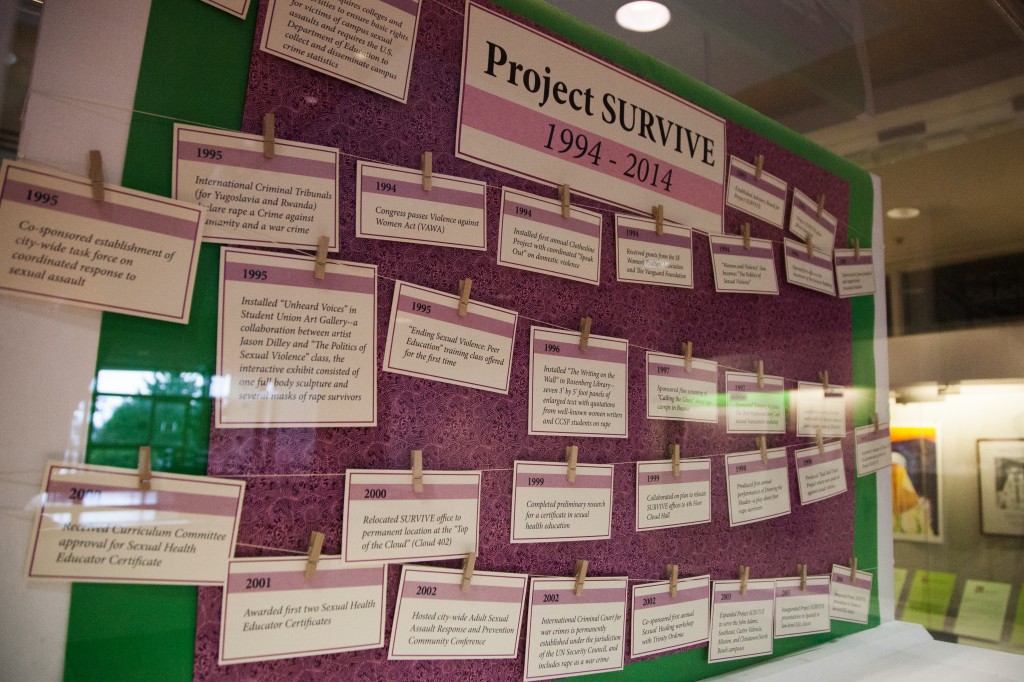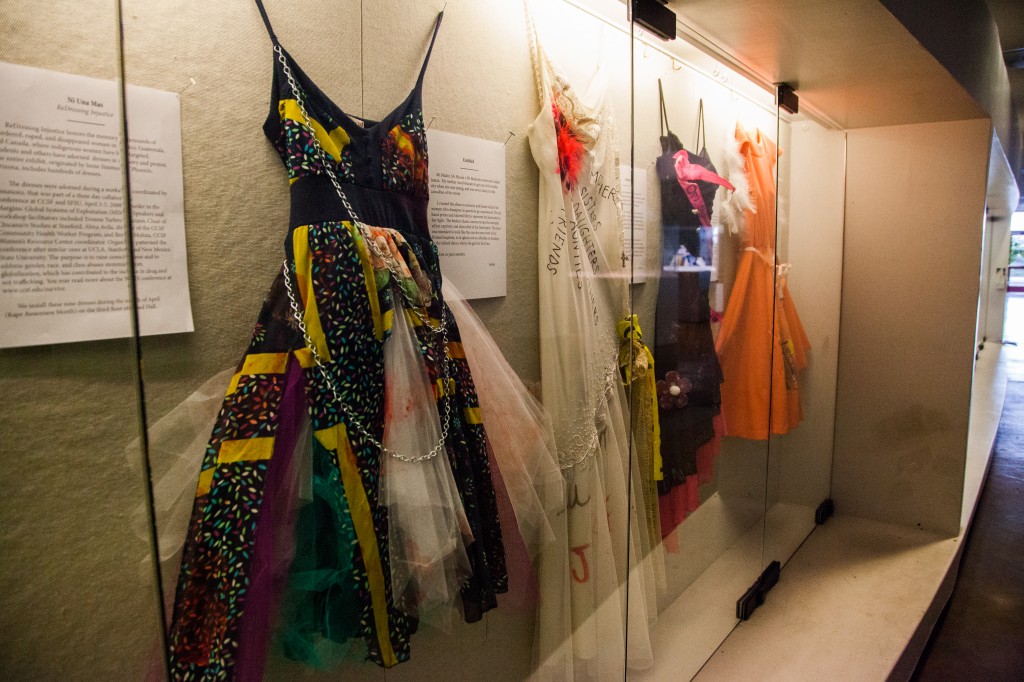Project SURVIVE turn 20


By Charles Innis
The Guardsman
Since 1994, City College’s Project SURVIVE has given over 4,000 peer presentations tackling the oft-avoided subjects of sexual violence and abusive relationships to students.
The peer-education program, administered through the Women’s Studies department, trains students to present on these issues in order to dispel myths surrounding rape and promote healthy relationships. So far, they’ve reached over 80,000 students.
In honor of its 20th anniversary, Project SURVIVE is hosting an exhibition featuring artwork and student testimonials on the 2nd floor of the Rosenberg Library until April 24, 2015.
The artwork consists of paintings and drawings by artist Juana Alicia and a series of dresses designed by City College students.
The showcase of dresses, titled “ReDressing Injustice”, is a display of nine garments that represent the innocent deaths of young men and women who have been victims of sexual violence or unjust murder.
Students may have already noticed another part of the exhibit while ascending the Rosenberg Library’s five floors. Small quotes pulled from the exhibit’s 13 testimonials are plastered throughout the steps of the lobby’s stairs.
“The testimonials are the heart of the exhibit,” Project SURVIVE founder Leslie Simon said.
The testimonials contain statements written by past peer educators reflecting on their experience with Project SURVIVE.
“They represent the 200 or so that have served over the last 20 years and how the program has affected them or transformed them personally, academically and professionally,” Simon said.
“Project SURVIVE changed my life,” former peer-educator Mary Ignatius wrote in one testimonial. “The class empowered me to address my childhood abuse and process the death of my father, two experiences I had been too young and too fragile to comprehend.”
Every semester, peer-educators involved with Project SURVIVE lead discussions, role-play scenarios and present statistics in classrooms with the intent of educating fellow City College students about sexual violence.
“I think what makes it special is its your peers,” said Kim Moore, a current peer-educator. “I think that makes a difference because it’s less threatening and we’re able to relate to each other on a peer to peer level.”
Moore first joined Project SURVIVE in 2011.
“I’m a rape survivor,” Moore said. “When I enrolled in 2011 I didn’t know what I wanted to do but I did want to know why I was raped. I saw a class which was Politics of Sexual Violence and I decided to take that class.”
Moore watched a Project SURVIVE presentation for the first time while taking Politics of Sexual Violence and the experience motivated her to join the program as a peer-educator.
“I had this ‘a-ha’ moment. I was inspired and it touched me in a very deep level,” she said.
Project Survive gave 60 presentations per year during its infancy in the mid 1990s and has since grown to give about 400 per year.
For many students, Project SURVIVE is a steppingstone on a path to a career in social work or public health.
Those who complete the program’s associated classes, Politics of Sexual Violence and Ending Sexual Violence: Peer Education, receive a sexual health educator certificate.
Having this certificate and the experience of working with Project SURVIVE may lead to positions in community-based organizations, Simon said.
“I am now able to share Project SURVIVE’s philosophies in my career, where I work with people who have mental health challenges,” former peer educator Ivy Eng wrote in a testimonial.
Project SURVIVE’s 20th anniversary comes at the end of a year where sexual assault was a pervasive topic in news media.
Columbia University student Emma Sulkowitz made headlines in The New York Times in September for carrying a 50-pound mattress around her college campus in protest to the school’s alleged inactivity in regards to a sexual assaulter.
President Barack Obama also reauthorized the Violence Against Women Act in March 2013 and launched the “It’s On Us” campaign in September of this year in order to raise awareness of sexual assault on college campuses.
Starting next spring, all City College freshmen will be mandated to see a sexual violence presentation online.
“But we see that as the floor,” Simon said. “Project SURVIVE is the ceiling. You don’t want to do this one shot thing online. You want to infuse the campus with this information.”
A variety of courses watch Project SURVIVE’s presentations every semester as part of their curriculum, including Health, Psychology, Sociology, Learning Assistance and English classes.
City College Sociology instructor Jessica Sabolboro brings her classes to see Project SURVIVE’s “Drawing the Shades” presentation every year.
“Having that experience for students is very necessary and very urgent,” Sabolboro said.
Project SURVIVE has already begun extending its services to San Francisco high schools with a recent program called Expect Respect SF. The program currently presents workshops in 16 different high schools.
Getting more youth involved in sexual violence education is Project SURVIVE’s next plan, Simon said.



Comments are closed.